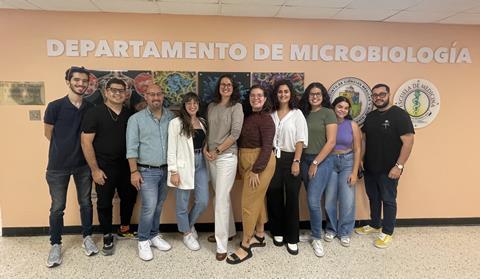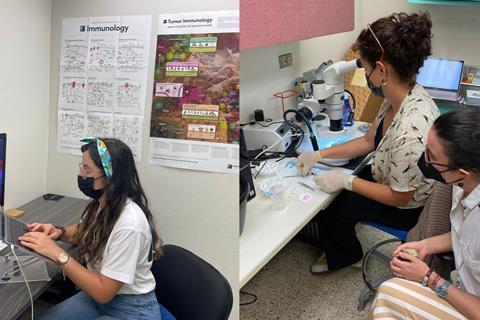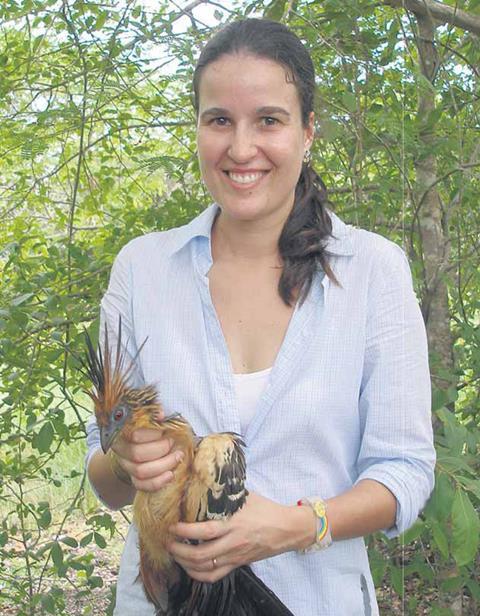Metagenomics and its applications have revolutionized the field of microbiology and medicine.
Humans, animals, and plants have co-evolved with microbes (bacteria, archaea, fungi, parasites, and viruses), and we now know that the microbiome can modulate both health and disease. Given our ability to sequence microorganisms from all sample types and the numerous favourable public computational pipelines and tools, most scientific domains now have integrated microbiome studies.

The mission of the University of Puerto Rico School of Medicine’s Microbiome Lab (San Juan, Puerto Rico) is to translate microbial ecology to improve human health and empower education in the microbial sciences in the region.
The lab is directed by Dr Filipa Godoy-Vitorino, an Associate Professor and Chair at the Microbiology Department (San Juan, Puerto Rico). Filipa is a native of Portugal and has developed her career studying biodiversity associated with animal and human microbiomes, investigating an eclectic collection of topics, including evolution, community dynamics, and biofilm succession. She has contributed to improving knowledge of how animal-associated microbiota benefit their hosts, impacting studies of host ecology, evolution, and conservation.
Microbiome-driven malignancies
The UPR microbiome lab aims to understand the coevolution of microbes with their hosts, the symbiotic mechanisms underlying microbial community establishment, resilience and persistence, as well as the processes of dysbiosis leading to disease phenotypes.

A major focus has been on microbiome-driven malignancies and the role of the microbiome in promoting carcinogenic processes or helping in the improvement of host immunity.
Cervical cancer (CC) is the fourth most common female malignancy worldwide and mortality rates are three times higher in Latin America and the Caribbean than in the United States. Persistent infection with high-risk human papillomavirus (hr-HPV) types is necessary but insufficient to cause cervical cancer.
Other yet unknown cofactors are required to promote hr-HPH persistence and progression to cancer, and we believe the answer lies in the vaginal microbiome. Our overarching goal is to identify microbial inter-species interactions and host factors that control hr-HPV persistence and cervical disease, and for that, to our knowledge, we have the largest women sample biorepository for human microbiome studies in the Caribbean region.
We are combining microbiome, metabolomics, proteomics and inflammation profiles while considering cervical neoplasia and HPV genotypes in Hispanics living in Puerto Rico and our work has excellent translational potential (NIH-NIHMD U54MD00760036-8538). The lab also counts on the collaboration of researchers from UCSD, to develop deep metagenomic sequencing of these vaginal communities and with MDACC researchers to evaluate the microbiota in cervical cancer patients undergoing different therapies.
Gut microbiome
Another important project related to microbiome-driven malignancies includes gut microbiome and viroimmunotherapy. We aim to understand the association between gut microbial communities and oncolytic viral therapy efficacy in solid tumors with an emphasis on glioblastoma (a collaboration with MDACC oncologists via U54CA09629718-6434.
These advancements could help increase the success rates of solid tumor treatments by implementing combinatory therapies using viroimmunotherapy and gut microbiota modulation.

Among our human microbiome projects, we are also interested in understanding the role of oral microbiomes in the development of periodontitis and head and neck cancer; the differences between gut microbiomes of healthy geriatric patients with and without Alzheimer’s disease; and studies of oral microbiome in healthcare worker participants during the COVID pandemic.
Indigenous ecology
The lab also focuses on the study of indigenous species of plants and animals and collaborates with marine biologists and ecologists in many conservation studies while supporting a variety of students of different backgrounds in developing their thesis.
Among these non-human related projects, we highlight the study of the microbiome of native bees of Puerto Rico facing anthropological changes and characterizing their potential for new antibiotic products.
Additionally, we study the gut microbiome of mangrove crabs, leatherback turtles, sea urchins, and dolphins and the soil and rhizosphere microbiota in different geographical regions.

We also collaborate with researchers evaluating the effects of heat stress on the microbiome of the reproductive tract of Wild type and Slick cows and support other studies across Latin America, including the gut microbiome of wild birds (Venezuela), or the study of the gut microbial communities of the plastivore larvae Galleria mellonella consuming different types of plastics (Argentina).
This highly active laboratory has pioneered the use of metagenomics and bioinformatic tools to study the human microbiome and unique tropical host-microbe interactions in the Caribbean, and favours close mentoring, scholarship, and teamwork while empowering education in the microbial sciences in the region.
Follow us at:
https://www.instagram.com/thegodoylab/
https://md.rcm.upr.edu/micro/dt_team/filipa-godoy-vitorino/







No comments yet